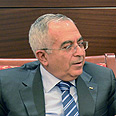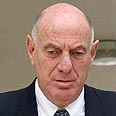
Salam Fayyad. 'A courageous, honest man'
Photo: EPA

Dov Weisglass
Photo: Shaul Golan
In late June 2002, I received a phone call from Condoleezza Rice, the Bush administration's national security advisor, who told me that a new finance minister: had been appointed in the Palestinian Authority: Dr. Salam Fayyad, an economist and banker who was well known in Washington as a former senior International Monetary Fund official.
I relayed Rice's request to Prime Minister Ariel Sharon,
and he said no. Rice asked us to speak to Fayyad in any case. "Explain it to him," she said. Together with the foreign policy advisor, Danny Ayalon, we met at the American ambassador's residence. We were introduced to a modest, gentle man with impressive knowledge.
"A talented and decent man," Rice said. "We must help him renew the transfer of tax funds." I knew exactly what she was referring to: According to the Oslo Accords, Israel is in charge of collecting tariffs on foreign imports to the Palestinian territories and value added taxes; the funds are transferred to the PA once a month. When the bloody period of the Intifada began, in late 2000, Israel stopped transferring the money.
Palestinian Authority
Washington says recognizes outgoing Palestinian prime minister's efforts 'to support establishment of viable, independent Palestinian state'; Canada 'deeply disappointed'
Fayyad explained that he was a "finance minister without a treasury." The tax funds collected by Israel make up about 70% of his budget, and without them he won't be able to function. He elaborated on his plans: Reorganizing the security services, improving and developing the economy, fighting corruption and the monopolies, stopping the violence and restoring peace and stability.
"As long as the Israelis have no security, the Palestinians will have no security either," he said. "And as long as there is no security, the two people will not have a normal life."
I went back to Sharon. "An impressive man," I said. "The situation is so bad that we have nothing to lose. We'll give him a chance. If we find out that the money is finding its way to the wrong hands – we'll stop." Sharon nodded. The transfer of funds was resumed.
Since then, in his roles as finance minister and prime minister, Fayyad created a revolution in the Palestinian lifestyle and in Israel-PA relations. The security forces were reorganized: The "Intifada generation" was replaced with worthy people, who were trained to do their jobs; the armed gangs dominating the streets were driven away and crime was terminated; the terrorism against Israelis from Judea and Samaria came to an almost complete halt; the government and public fund management underwent a fundamental reform; the "family" monopolies controlling imports and trade were dissolved. For all this, and more than once, Fayyad nearly paid with his life.
Lived up to his principles
Fayyad was right. And he succeeded: The security, the calm, the stability and the disappearance of terror and crime revived the Palestinian economy. Trade with Israel was restored, foreign capital investments came in, tourism was renewed, a construction and development boom started, and internal transportation was improved.Fayyad gained the trust of the international community, and unlike in the past, the world's nations had no hesitations entrusting hundreds of millions of dollars to him for the PA's development.
It should be stressed that Fayyad is a courageous, honest man and a great manager, but he is not a political man. I doubt his many achievements would have taken place without the full political and public support he received from Mahmoud Abbas. Like Fayyad, Abbas strongly objects to any expression of terror or violence as a means of fighting Israel. "There will be no military solution to the conflict," he declared in front of the entire world at the Aqaba Summit in June 2004. "Terrorism against Israelis wherever they are will stop."
These two lived up to their principles – Fayyad in the implementation and Abbas in the backing – and these two are the "no partner" (or the "irrelevants") of the previous Israeli government (the current government has yet to take the time to deal with it).
Fayyad's retirement from Palestinian national life is bad for the PA and bad for Israel. The PA without him, and likely soon without Abbas either, will be different. The Israeli stance that "there is no one to talk to" may turn into a self-fulfilling prophecy.
Dov Weisglass was former Prime Minister Ariel Sharon's bureau chief















